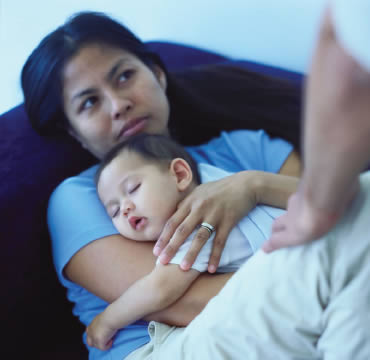The women of today fulfil a wide range of roles, from working full time, to being responsible for both family and house. They are the main caretakers for children, and quite often, elderly and/or infirm parents. This type of lifestyle is highly stressful, and since women tend to focus on caring for others to the extent of neglecting their own needs, this adds significantly to their level of stress.
All this contributes to women’s vulnerability to mental health problems such as depression, which affects around 20% of women over the course of their lifetime, as opposed to 10% for men.
Likewise, the time when a woman has a baby triggers powerful emotions that range from excitement, joy, fear and anxiety. Even hormonal changes caused by miscarriages can trigger these overwhelming feelings and may result in postpartum blues (PPB).
If left untreated, this condition can become severe enough to be classified as postpartum depression (PPD). PPD does not reflect a character flaw or represent weakness.
While PPD is not as common in Malaysia, it does exist, and it is important that you and your spouse are not just aware of it, but know how to recognise the signs in order to be prepared to deal with it
should it occur.
Currently, the incidence of postpartum depression in Malaysia is low and estimated to be around 4%.
The Dangers of PPD
by Datin Dr Ang Kim Teng, President MMHA
While Post Partum Blues (PPB) is more common and typically lasts between a few days to two weeks, it can lead to PPD, which can be harder to recognise.
PPD can lead to interference with day-to-day activities. This could easily lead to social conflicts with family and friends, which in turn may lead to the mother being alienated or she may alienate herself, thus exacerbating her condition. If there are other children, they will also be affected by their mother’s condition, which could lead to negative influences to their psychological and intellectual development.
In extreme cases, PPD may lead to Postpartum Psychosis. It is marked by psychotic thoughts, delusions, hallucinations, and agitation which make it difficult for the mother to control any impulse to harm her own self or others (including her own children). One well known case of Postpartum Psychosis is that of Andrea Yates from Texas who drowned all five of her children in 2001.
Implications:
- Dangerous to your baby and mother.
- Loss of emotional bonding with your baby.
- Poor quality of life for the mother suffering from PPD.
- Relationship problems between the couple and with other family members (there will be misunderstandings/misgivings on the attitude of mother with PPD, especially if no one knows that she is sick and needs professional help).
- Suicidal ideations.
PPD does not discriminate
PPD can happen to anyone, regardless of race, ethnicity, age, culture, education, and it certainly doesn’t matter whether you are a new mother or have had several children. However, the following factors will make you more vulnerable to developing PPD.
- Lack of emotional or financial support from family/spouse
- Family history of depression
- Past history of depression or depression during pregnancy
- Difficulties in close relationships
- Sleep deprivation
- Severe bouts of PPB
- Work or other personal problems
Recognising PPD
The most important thing to keep in mind is that Post Partum Depression (PPD) is treatable. The first step would be to recognise PPD and to get it treated. A simple tool to check is by taking a quick questionnaire called the Edinburgh Postnatal Depression Scale (EPDS). The total score is calculated by adding together the numbers you circle for each of the 10 questions. Scores above 13 would indicate a depressive illness, but for an actual diagnosis, it is important to consult a doctor.
Q1 I have been able to laugh and see the funny side of things.
Score
0 As much as I always could
1 Not quite so much now
2 Definitely not so much now
3 Not at all
Q2 I have looked forward with enjoyment to things.
Score
0 As much as I ever did
1 Rather less than I used to
2 Definitely less than I used to
0 Hardly at all
Q3 I have blamed myself unnecessarily when things went wrong.
Score
3 Yes, most of the time
2 Yes, some of the time
1 Not very often
0 No, never
Q4 I have been anxious or worried for no good reason.
Score
0 No, not at all
1 Hardly ever
2 Yes, sometimes
3 Yes, very often
Q5 I have felt scared or panicky for no very good reason.
Score
3 Yes, quite a lot
2 Yes, sometimes
1 No, not much
0 No, not at all
Q6 Things have been getting on top of me.
Score
3 Yes, most of the time I haven’t been able to cope at all
2 Yes, sometimes I haven’t been coping as well as usual
1 Not very often
0 No, not at all
Q7 I have been so unhappy that I have had difficulty sleeping.
Score
3 Yes, most of the time
2 Yes, sometimes
1 Not very often
0 No, not at all
Q8 I have felt sad or miserable.
Score
3 Yes, most of the time
2 Yes, quite often
1 Not very often
0 No, not at all
Q9 I have been so unhappy that I have been crying.
Score
3 Yes, most of the time
2 Yes, quite often
1 Only occasionally
0 No, never
Q10 The thought of harming myself has occurred to me.
Score
3 Yes, quite often
2 Sometimes
1 Hardly ever
0 Never
You should also be on the lookout for the symptoms of PPD not just in yourself, but also if you have any family members, friends or even a spouse who has recently given birth; help observe whether any of the symptoms listed below appear, and if they do, encourage her to seek professional help. The symptoms include:
- Feeling unable or unwilling to care for your baby.
- Having frequent thoughts about bad things that could happen to your baby.
- Thoughts of hurting your baby.
- Irritability, marked agitation or restlessness.
- Feelings of worthlessness or hopelessness.
- Lack of energy or unexplained fatigue almost everyday.
- Prolonged periods of sadness/depression.
- Loss of interest/pleasure in previously enjoyed activities.
- Lowered self-esteem.
- Feelings of self-loathing.
- Suicidal thoughts/talking about ending your life.
- Sleep disturbances.
Dealing with PPD
by Dr H Krishna Kumar, Consultant and Head of Department of Obstetrics & Gynaecology and Immediate Past President
What can you do if you recognise the tell-tale signs of Post Partum Depression (PPD)? It doesn’t matter if it’s yourself, your wife, your sister, your friend, or anyone else for that matter; what’s important is for you to take the initiative to help encourage them to seek professional help to ease their sufferings.
Minimise your risk
Get as much social support as possible either from your spouse, family members, or even friends. Try exercising when you can as your body will release endorphins – these chemicals will engender positive feelings in your body.
Remember not to try doing everything on your own; get others to help out by delegating some of the responsibilities of raising the new-born child which can go a long way in easing your mental stress. Limit your intake of alcohol and caffeine, and be sure to keep a close eye on your mental and emotional health. Also, try getting as much rest as possible to avoid sleep deprivation which could worsen the situation.
Get yourself checked out
If you do suspect that something is amiss, first consult your local GP to rule out any medical complications (which may have PPD-like symptoms) as they may have a secondary effect of causing depression. The best thing you can do is to get yourself checked out by a mental health professional to get a definitive diagnosis for your condition.
Treatment for PPD will vary from case to case and usually includes counselling sessions and/or medications.







Comments